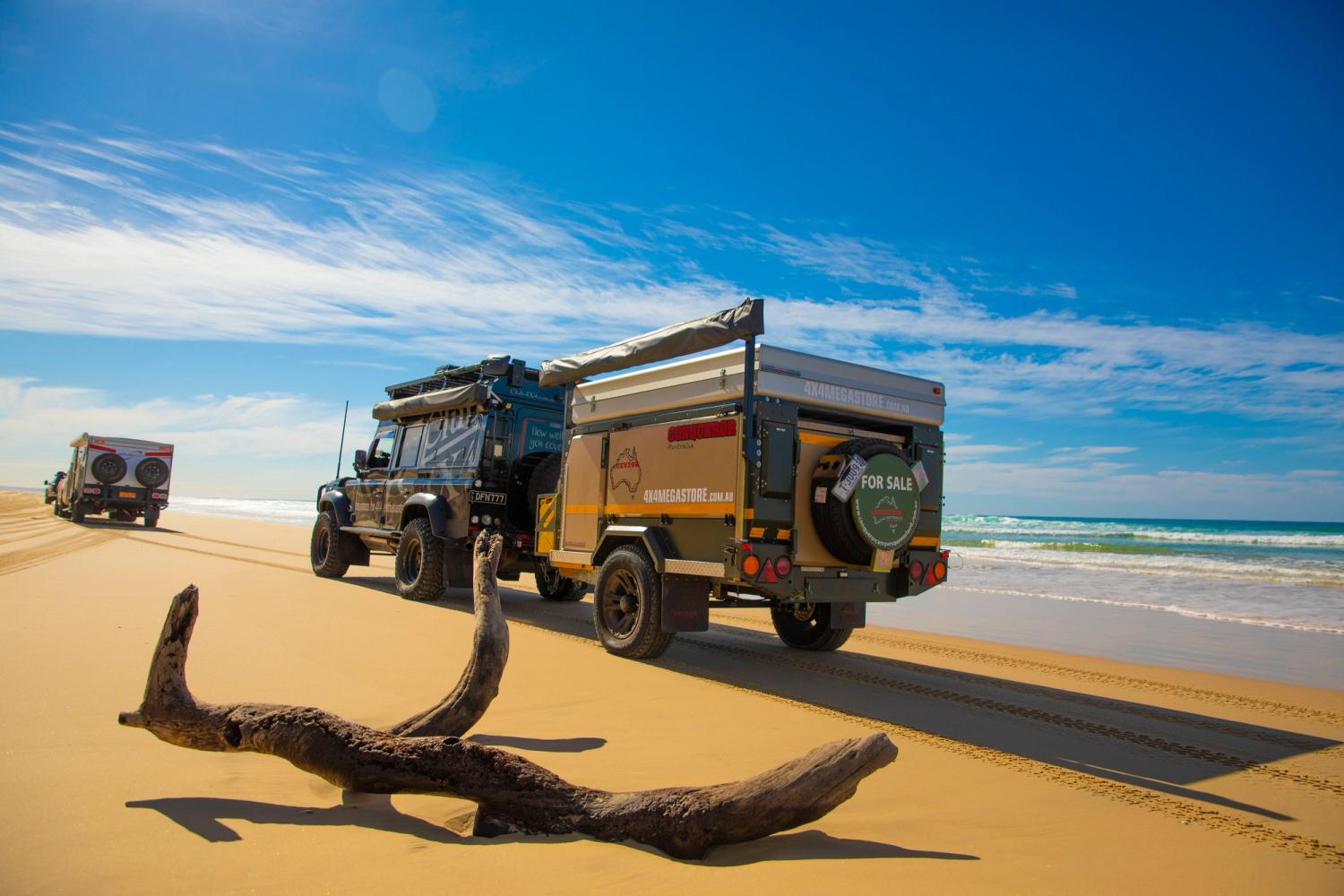So the big supermarkets have now had hot cross buns available in store for about 12 weeks, which tells us it’s almost time for the Easter break. For many of us, this means packing up the clan and all the gear and heading off somewhere to enjoy the great outdoors for a few days. So what are the things you need to consider when it comes to making sure you get to your destination and back safe and in one piece.
This is by no means a be-all and end-all but a good starting point.
1) Routine Maintenance – This is an important one. Trailers could have been in storage for a few months, your daily touring and/or tow rig might be due for a scheduled service and your specialised touring rig may not have been cranked over since your trip to the Cape in July. Whilst not to go as far as talking about recommissioning, there are certain things you should always do to make sure your setup is safe to do the long, often arduous driving during this period.
a. Daily tow rig – This is what most of us mere mortals will have – the daily vehicle that is setup as a tourer or tow vehicle. It gets us through the mundane week to then search for adventure on weekends and holidays. Check your log books and if it is due for a service, book it now before it’s too late! This is especially important if you’re coming up to a major service like a 100,000km interval or if you are doing some seriously remote travel. At the same time, you can ask your mechanic to conduct a pre-trip inspection while it’s up on a hoist. Weeping shocks and tired bushes? Now’s the time to get it done! Make sure your tyres are up to the task (including your spare/spares!) and alignment and balance are still to spec. There’s nothing more tiresome than a front end that wants to continually track one way or send vibrations up the steering column, especially when towing and/or driving for hours. Remember though, your car will always be set to pull to slightly left – a simple safety measure in case one was to fall asleep behind the wheel. Your mechanic should do a quick check of your electrics – batteries can be checked for health and alternators for their charging ability. If you’re going somewhere super remote, get your mechanic to replace things like air/fuel filters and hoses. You should keep the old ones as spares to take on the trip just in case something happens!
b. Specialised touring/tow rig – For the lucky ones, this is the toy that sits on a trickle charger until it’s time to hit the dirt! The good news is that much of your prep is similar to the maintenance routine for your daily tow rig, but if it doesn’t get turned over or moved for months on end, some steps may differ. Check on things like rubber hoses, tyres and seals. Many of these items can get brittle if not used regularly and cause significant issues later on in your trip. If it has not been sitting on a trickle charger, make sure your battery system is tested to ensure its health.
c. Trailers – Let’s face it, not all of us have the time to use our Camper Trailer, Caravan or even our Slide On Camper often enough. A lot of the time these are kept in the shed (if they’re lucky) or on a driveway, often uncovered and exposed to the elements. Rust, water, mould and other issues that result from lack of use and exposure can be big issues when it comes to using your trailer. We all know the importance of loading them up correctly to manage weight and ensuring your tow rig is capable, but it’s often the routine stuff that causes the biggest issues. Are your wheel bearings still packed with grease and in good condition? Are your tyres in good condition? Sitting too long can cause them to become hard and brittle. Remember to check major welds and draw bars as a good start. Finally, don’t forget to check all your electrics including any brake controller connections.
2) Check your gear – This does range – but think about it. From solar blankets, to tents and swags to camp chairs and compressors. Each of these items play an important part to the enjoyment of your trip so it’s best to make a list of what you need for your trip as you pull them out and test them! Give yourself enough time to replace what you need before your trip. Ensure you have a reasonably sized and well equipped toolkit. It’s not about being able to do an engine swap, but what tools would you need for serviceable parts on the go? There are plenty of good guides out there written by accomplished and experienced travellers so get Googling! Finally, make sure you give adequate time to checking your safety and survival kits. Even more important when planning remote trips, pack a first aid kit and survival materials. They can be the difference between life and death and should always be coupled with a satellite phone or EPIRB to be able to call for help in an emergency.
3) Make sure you have the booking information on your campsites – or if you are planning on going free – camping, have some options. Pretty obvious stuff but know where you’re going. If you’re looking to camp at holiday parks then make sure you have a confirmed booking as things can get incredibly busy at this time of year. The likelihood is that if you didn’t book straight after Christmas, you won’t be getting in to the more popular spots anyway but make sure you’ve checked! If you decide to go free camping again, make sure you have options as some of the most popular campgrounds can get really busy – it pays to have a Plan B!
4) Know your route – We humans are funny creatures. I know I usually overestimate how many kilometres I can cover – usually when I’m traveling with the rest of the family! Sometimes it’s good to have a few cracks at your trip plan. Remember to try and balance the destination with the travel itself. That’s the whole point of a road trip isn’t it? Taking the time to smell the roses and look out the windows? Consider how many hours a day you’d like to drive, who you’ve got travelling with you and what you want out of the holiday trip. Could you condense the trip to get more out of one area?
5) Take your time and think safety – We love our road trips as much as the next camper, but there is a need to appreciate that it can be incredibly dangerous. During these peak periods, we are hitting the roads with hundreds and thousands of others who have similar plans. Sometimes these people don’t have the same amount of experience as others. Long distance travel and highway driving can be foreign concepts to some people, believe it or not! So take your time, try to travel when less people are going to be around. Personally, I would prefer to be on the road before sun up but this is also fraught with the danger of animal strikes so be careful either way. Never drive beyond your means. It’s always better to drop back 20km/h rather than push through and risking your vehicle and your life.
Be safe this Easter season.
Happy Touring!
Kal


